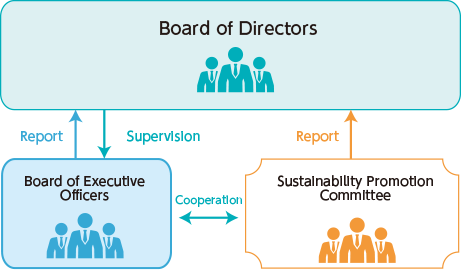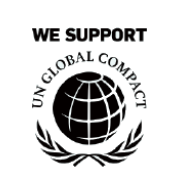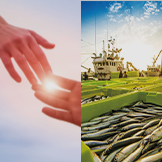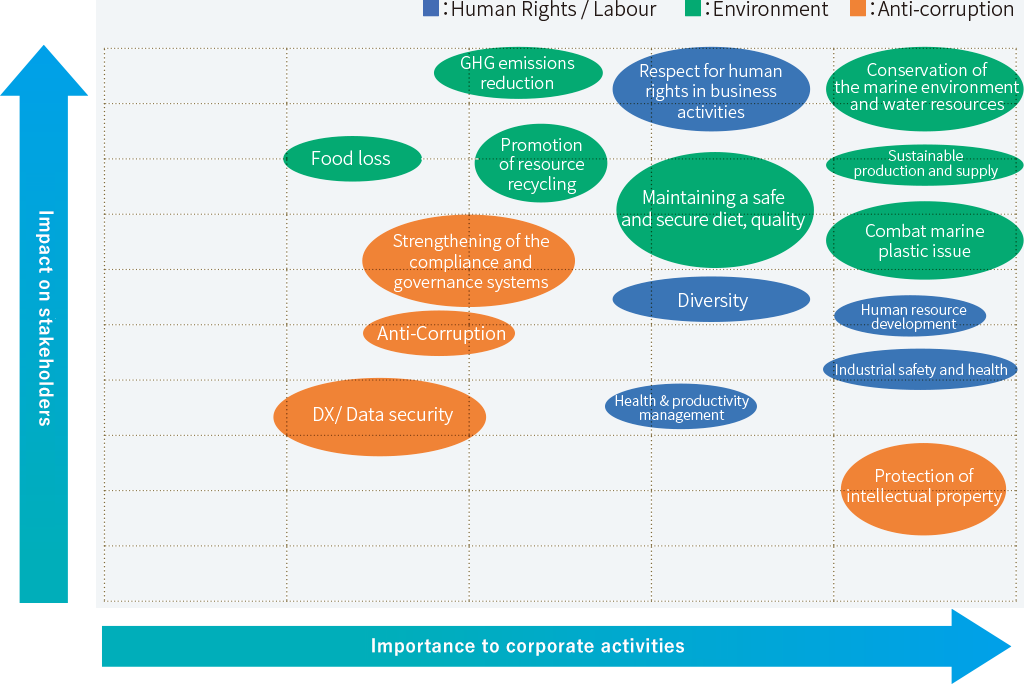Basic policy on sustainability:
Opening the way to a sustainable world
Since announcing its basic policy on sustainability in December 2021, the Nichimo Group has set “Opening the way to a sustainable world” as the foundation for employees’ thinking and actions. We are now promoting sustainable management as a major challenge for the future.
As a provider of total support encompassing all processes from the fishing to the processing and sales of marine products, in conducting business activities, we continue to fulfill our responsibility by engaging in sustainable management to conserve abundant marine resources and support environmentally friendly production and logistics, while responding to the global expansion of demand for marine products.
Nichimo Group’s approach to its goal for sustainability
The Nichimo Group’s goal for sustainable management is focused primarily on striving to increase our corporate value over the medium to long term. Our approach is to fulfill our responsibility of conserving the ocean’s rich resources and supporting environmentally friendly production and logistics of marine products through cooperation within the Group with a view to covering “From Ocean To Dining, Challenges For The Better Future” in line with our corporate philosophy since our founding. Since our main business areas are in the fishing and marine products industries, in a society that has recently become more aware of conserving the natural environment and natural resources, we believe that striving to increase our corporate value over the medium to long term by fulfilling our responsibility of conserving the ocean’s rich resources and supporting environmentally friendly production and logistics of marine products is what is strongly demanded of the Nichimo Group and it is the Group’s responsibility.
From a perspective of increasing corporate value, the initiatives that we emphasize in promoting sustainable management, such as marine and land-based aquaculture and biomass fishing nets that are biodegradable in the natural environment, have attracted many inquiries due to the high level of attention on sustainable business.
In terms of risk management, insufficient consideration for the marine environment and resources increases procurement risk for marine products. In regard to initiatives to reduce greenhouse gas emissions, the potential to significantly impact the Group’s results cannot be ignored, due to factors such as an increase in costs arising from carbon taxes, which are currently under consideration.
In light of the above, we are promoting our current sustainability-conscious business activities, and we have also started initiatives for new businesses in an effort to achieve an increase in our corporate value that outweighs the increase in costs.
Furthermore, we have been using the PDCA cycle stipulated by ISO to manage and optimize planning and target-setting for these initiatives, as well as progress and improvements. In this way, we are working to achieve them by the shortest possible route.
Sustainability promotion system

The Nichimo Group established the Sustainability Promotion Committee as a forum to govern the promotion of sustainable management, with the aim of fostering an appetite for sustainability and contributing to the realization of a sustainable world through all of the Group’s businesses. Chaired by the President and Representative Director, this Committee is established as a subordinate body to the Board of Directors. This ensures that a system is in place where details deliberated and decided by the Committee are regularly reported to the Board of Directors.
Roadmap for sustainability promotion activities

Endorsement of the United Nations Global Compact

The Company endorses the United Nations Global Compact (UNGC), and was registered as a participating company in May 2023. Accordingly, the Company has been promoting sustainable management even further by observing and practicing the ten principles related to the four areas of “Human Rights, Labour, Environment, and Anti-Corruption” stipulated by the UNGC.
Four areas and ten principles of the United Nations Global Compact
| Human Rights | Principle 1: | Businesses should support and respect the protection of internationally proclaimed human rights; and |
|---|---|---|
| Principle 2: | make sure that they are not complicit in human rights abuses. | |
| Labour | Principle 3: | Businesses should uphold the freedom of association and the effective recognition of the right to collective bargaining; |
| Principle 4: | the elimination of all forms of forced and compulsory labour; | |
| Principle 5: | the effective abolition of child labour; and | |
| Principle 6: | the elimination of discrimination in respect of employment and occupation. | |
| Environment | Principle 7: | Businesses should support a precautionary approach to environmental challenges; |
| Principle 8: | undertake initiatives to promote greater environmental responsibility; and | |
| Principle 9: | encourage the development and diffusion of environmentally friendly technologies. | |
| Anti-Corruption | Principle 10: | Businesses should work against corruption in all its forms, including extortion and bribery. |
Significance of the Group’s efforts
-

Human Rights
Labour
Developing diverse human resources to cover “From Ocean To Dining” and engage in social issues, and providing a healthy working environment where they can work with a sense of security
-

Environment
Contribute to the conservation of the marine environment and the sustainable production and supply of marine products
-

Anti-Corruption
Rigorous governance and compliance, conscious of management of diversifying risks and adherence to the Charter of Corporate Behavior
Materiality (material issues)
In the process of identifying the materiality, the Group views the ten principles set forth in the UNGC as common global issues, then works to narrow the scope down to priority issues, being conscious of consistency with issues in the fishing and marine products industries, where the Group operates its business, and issues in the Group’s own business environment. In FY2023, the materiality was determined and targets were set. We will continue to strive to improve the accuracy of our activities by engaging with experts and stakeholders and implementing continuous improvements.
The Nichimo Group’s materiality identification, implementation and accuracy enhancement process

Materiality identification process
-
- STEP 01
- When materiality was identified, a person in charge was selected from each department and a basic course was held. Subsequently, we compiled a list of current issues and the ideal state of the Group from the perspectives of the environment, society, and governance (identification of social issues).
-
- STEP 02
- In order to integrate these efforts into our medium- to long-term management strategies and plans, we again conducted training sessions, including at the management level. In light of the UNGC’s ten principles in four areas and related international declarations and conventions, we mapped the material issues under the guidance of the Sustainability Promotion Committee members, based on the two axes of “importance to the Group’s corporate activities” and “impact on society and stakeholders.”
-
- STEP 03
- Based on the results, a draft of the materiality was prepared by the secretariat, discussed and approved by the Sustainability Promotion Committee, and formally identified as the materiality.
Materiality map


